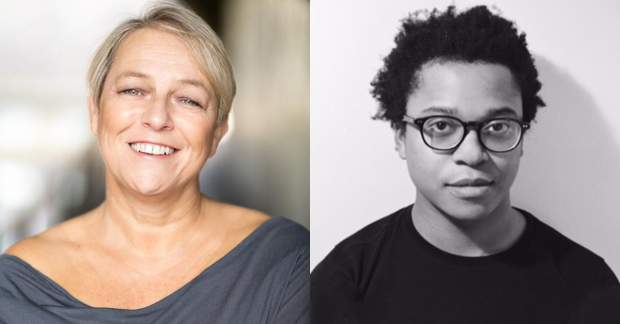Interview: Kiln associate directors Susie McKenna and Taio Lawson on the venue's new season

Susie McKenna and Taio Lawson are associate directors at the Kiln Theatre in Kilburn, which has just announced its new season.
Among the highlights is NW Trilogy, a collection of short plays co-directed by McKenna and Lawson and written by Moira Buffini, Suhayla El-Bushra and Roy Williams. They will explore "what it means to be part of one of the most dynamic communities in the world".
How did NW Trilogy come about?
SM: A huge project called Mapping Brent took place over a few years at Tricycle/Kiln theatre including many community plays during the refurbishment. A lot of that research with the community sparked the idea for the Trilogy – to celebrate communities and their contribution to Brent but also the UK in general.
TL: The Mapping Brent project offered a starting point, and being invited to celebrate Brent as the London Borough of Culture gave us an opportunity to investigate key events in the borough's history which were lead by different communities that migrated to Brent. We were spoilt for choice, with so many stories, events or themes that deserved to be on our stage.
Why did you want to work with these three writers?
TL: I mean, their work and talents probably answer that. More specifically Roy, Moira and Suhayla are three incredibly gifted writers who all have a relationship with the borough and/or the communities that inspired the stories. We are incredibly happy to have all three artists on this.
SM: Who wouldn't want to work with three of the best playwrights in the UK right now? Apart from the fact that all three have strong connections to North West London, they are all incredible at telling everyday stories in an extraordinary way. The thought of having one evening with these three writers and the people they are celebrating from Brent is really exciting – showcasing our community on the London and world stages.
Although the stories are drawn from the past, do they have particular resonance for these times?
SM: So much is being discussed about the way we teach history and whose history we are telling our children. Knowing a truth about this country's past is essential for our society to move forward. It's often the human individual's stories that are the most powerful when it comes to understanding and walking in another person's shoes, so yes this trilogy will have a lot of resonance with the politics of now – have things changed? Are we celebrating our multicultural society enough?
TL: It may feel to some that just because there is greater access to clear figures that highlight the inequalities of our society, or that we can see a video of David Lammy putting a caller on his radio show in their place, that we have moved on leaps and bounds, and are actually pushing for more. In some regards we are. However, in too many ways we are still fighting for the most basic of things. Some people still think Enoch Powell was right… So sadly, yes they will still resonate, because too little has changed in such a great amount of time.
You are both associates at the Kiln – what does the venue mean to you?
TL: It was my local theatre for seven years, so it's home for me. I know it as the place that meets both the micro and the macro, working to amplify both in clear and heartfelt ways. For example, on Tuesdays during the pandemic, we have collaborated with local restaurants to give free food to those in our communities that need it most, with an initiative called Food For All.
We have also worked incredibly hard to fundraise in order to continue to commission writers from the freelance community, meaning that we can keep telling stories that put unheard voices and perspectives into the mainstream. Both these things are equally important to us at Kiln, we see them both as our responsibility. My daughter however knows it as the place that used to do the best bacon sandwiches, despite now saying that she is vegetarian. Different strokes for different folks.
SM: Working in theatres that have a strong community footprint has always been the most enriching experiences in theatre I have had . So for me it was a no brainer, when asked, to join the Kiln theatre team. To work on new writing that sets out to hear the unheard, to tell the unknown stories of voices we are rarely exposed to is a dream come true.
How optimistic are you feeling about theatre returning in full this year?
TL: There are a few reasons to be optimistic. One big, blonde reason to not be. These plays are as much about resistance and resilience as anything else. So I am being lead by that, resisting intrusive thoughts and focusing on the positives. Be the change you want to see and all that. If we want theatre back, we have to work for it.
SM: Like everyone else I am praying that our industry can get back to full strength as soon as possible, and so we have to be hopeful. Our energies must be positive – it's just hard when we can see light at the end of the tunnel but we don't really know how long the tunnel is but we are throwing all our energies towards that light.
What's the first thing you will do when restrictions finally end?
SM: Cook dinner for Taio, all the writers and creatives working on NW Trilogy – just the sort of production meeting I love!
TL: Firstly, eat Susie McKenna out of house and home because I hear she can whip up a feast. Then dance in a sweaty club with my kids and probably have to deal with social services the next day because of it.










